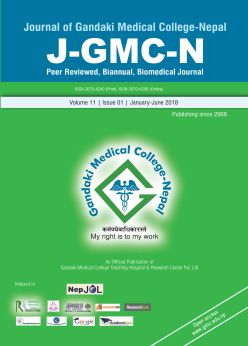Factors Associated with Poor Self-rated Health in Machhapuchhre Rural Municipality of Kaski District, Nepal: A Cross-sectional Survey
DOI:
https://doi.org/10.3126/jgmcn.v11i02.22960Keywords:
Happiness level, Health behaviors, Self-rated health, Perceived body weightAbstract
Introduction: Self-rated health reflects respondents’ overall perceptions of their general health status. It is a simple and reliable measure of general health status of the population.
Objective: The objective of the study was to assess prevalence and associated factors of poor self-rated health among adult population in Machhapuchhre Rural Municipality of Kaski District, Nepal.
Methods: A cross-sectional household survey was conducted among adult population at Machhapuchhre Rural Municipality. A structured questionnaire was used for the face to face interview. Household survey was conducted in July 2018. Self-rated health was measured by using a single question such as ‘In general, how would you rate your health?’ Responses were arranged along a five-point Likert-type scale: ‘excellent’, ‘good’, ‘fair’, ‘poor’ and very poor. The outcome variable was dichotomized as ‘good’ (excellent, good or fair) or ‘poor’ (poor or very poor). Chi-square test and multiple logistic regression analysis were performed; and odds ratios with corresponding 95% confidence intervals for poor self-rated health were presented.
Results: Of total respondents, 13.2% respondents reported that they perceived their health as poor. Of the total, 14.3% respondents stated themselves as overweight and 8.8% mentioned they were unhappy. The study found that illiterate respondents, respondents with smoking habit and the individuals with poor psychological conditions were more likely to perceive their health as poor. Illiteracy, current smoking, perceived overweight, unhappiness, suicidal ideation and having depressed feeling were significant factors associated with poor self-rated health in the study.
Conclusion: Education, health behavior and psychosocial health variables has important influences on self-rated health.
Downloads
Downloads
Published
How to Cite
Issue
Section
License
This license allows reusers to distribute, remix, adapt, and build upon the material in any medium or format for noncommercial purposes only, and only so long as attribution is given to the creator.

